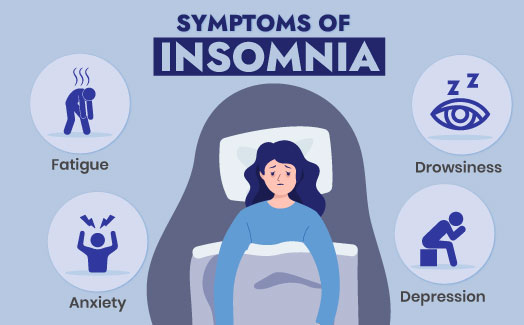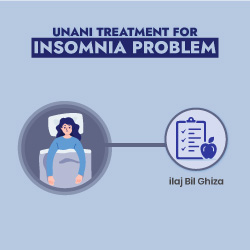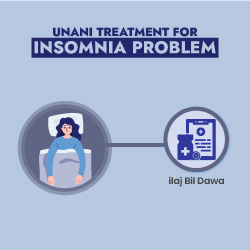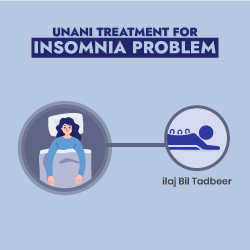Sleep is becoming precious for the world day by day because of the busy and fast life. People more frequently report sleep issues nowadays. Quality sleep plays a key role in maintaining the overall quality of life and well-being. insomnia Not getting the necessary amount of sleep can ultimately lead to bad mental and physical health.
Diagnostic and statistical manual of mental disorders (DSM-5) states insomnia (Sehar) disorders as unsatisfactory quantity and quality of sleep due to difficulty in falling asleep, keeping a sound sleep, or difficulty in returning to sleep despite having time for sleep. This condition is followed by distress and impairment related to sleep especially in daytime insomnia functioning like fatigue/less energy, daytime dizziness, low attention/concentration, and mood swings. These impairments with sleep are not connected to any other medical disorder, substance addiction, or prescription drug use. The symptoms must be there at least three nights a week for at least consecutive three months. (Roth and Roehrs, 2003
Bones provide
support to the body and aid in movement. Joints are places where two bones meet such as your elbow or knee. They may be immovable, slightly movable, or freely movable. A synovial membrane surrounds the movable joint. Inside the membrane, synovial fluid is present that lubricates the joint and also insomnia nourishes the cartilage. In addition, articular cartilage is tough slippery cartilage on the end of the bone which allows smooth joint movement Over time, a swollen joint can become severely damaged. Some kinds of arthritis can also cause problems in your organs such as your eyes or skin.
Types Of Insomnia
The American Academy of Sleep Medicine classifies insomnia (Sehar) into the following types: chronic disorder, short-term disorder, and other disorders.
Paradoxical insomnia
Also called sleep state misperception, paradoxical results when a person feels trouble in their sleep but there is no evidence of the presence of sleep difficulties. Underestimation of how much sleep they are getting is common in a person suffering from paradoxical insomnia.
Sleep-onset insomnia
Both chronic and short-term insomnia include trouble falling asleep when first lying down for the night, which may be considered sleep-onset insomnia.
Sleep-maintenance insomnia
Struggling in staying asleep throughout the night may be called sleep-maintenance insomnia, people with either chronic or short-term insomnia can also be affected. Difficulty with maintaining sleep throughout the night than with falling asleep is common among the Middle-aged and older adults with insomnia.
Behavioural insomnia of childhood
Previously, lack of sleep in children without specific items or routines was called behavioural insomnia of childhood. For example, a child’s inability to sleep without a favourite stuffed toy probably has been described as having this form of insomnia.
Fatal insomnia
Fatal insomnia is not a sleep disorder, Although it carries the word insomnia in its name. Preferably, fatal insomnia called fatal familial insomnia (FFI) is a very uncommon genetic disorder that causes progressive brain damage. Fatal familial insomnia is a neurological disorder that includes many symptoms, including increasingly severe sleep difficulties. (Robinson, 2021)
Symptoms of Insomnia (Alamaat wa Nishaniyan)
- Symptoms of insomnia include:
- Drowsiness during the day.
- Restlessness after a night’s sleep
- Feeling tiredness during the Daytime
- Depression, anxiety or irritability
- Concentration or memory problems.
- Difficulty inducing sleep at night
- Waking up in the middle of the night
- Waking up too early
- Low focusing on tasks
- Increased errors or accidents
- Ongoing sleep worries (Robinson, 2021) (Momin and Ketvertis, 2020)

Causes of Insomnia (Asbab)
Insomnia can be the primary condition or maybe a secondary condition I.e, associated with other conditions.
Chronic insomnia is usually caused as a consequence of stress (Izterab-e-Nafsani), life happening or other habits that cause sleep disruption. Treating the main cause can cure insomnia, but sometimes it can last for years. Insomnia can be due to voluntary causes (Ikhtiyari asbaab), temporary causes (Aarzi asbaab) or due to disease (Marzi asbab)
Other common causes of insomnia include
Disorders related to Mental health
Anxiety disorders like PTSD (post-traumatic stress disorder), may disturb your sleep. Waking up too early can be a symptom of depression. Insomnia can also occur with other psychological and mental health disorders as well.
Many prescription drugs can disturb the sleep cycle, such as some antidepressants and medications for blood pressure or asthma. Many over-the-counter medications such as some pain killers, anti-allergy and cold medications, and certain weight-loss products contain caffeine and other stimulants that can delay sleep.
Medical conditions
Some medical conditions like chronic pain, diabetes, and heart disease, Examples of conditions linked with insomnia include chronic pain, cancer, asthma, gastroesophageal reflux disease (GERD), Parkinson’s disease overactive thyroid, and Alzheimer’s disease.
Sleep-related disorders
Sleep apnea is a condition in which a person is unable to breathe periodically throughout the night, disturbing sleep. Restless legs syndrome is a condition in which there are unpleasant sensations in the legs and an almost irresistible intention to move them, which may interfere with falling asleep.
Caffeine, nicotine and alcohol
Stimulant drinks like coffee, tea, cola and other caffeinated drinks. Drinking stimulant drinks at night disrupts sleep and can keep you from falling asleep at night. Nicotine containing products are also stimulants that can disturb sleep. Alcohol can help fall asleep, but it unable’s the person to reach deeper stages of sleep and often causes awakening at midnight. (Santos-Longhurst, 2019, NIH)
Risk factors
affects females more than males and is more common among the aged population rather than youth. Younger and middle-aged African Americans are at higher risk of developing insomnia. Some common risk factors, such as the nature of the job or lifestyle, maybe modified but some factors cannot be changed. For example, your age and family history.
Common risk factors may include:
Age
One can suffer from it at any age but its chances increase with age.
Inheritance and Family History
Inheritance can play a major role in developing insomnia as insomnia runs in families. It is also decided by your genes whether you are a deep sleeper or light sleeper.
Occupation and Environment
The following can disrupt your sleep-wake cycle, a pattern that the body uses to process when to sleep and when to be awake:
- Night shift or night work (bedarie mufrat).
- Noise or light near bed during the night.
- High or low temperatures to an uncomfortable extent.
- Travelling to different time zones.
Lifestyle
Insomnia is sometimes associated with lifestyle habits. For example,
- Changing your normal routine now and then, including your sleep timings.
- Experiencing disturbance in your sleep, such as waking up to take care of a baby
- Taking long naps or short naps again and again during the day
- Too little physical activity and no tiredness at all during the day
- Using stimulants like caffeine, nicotine, alcohol, or recreational dry
- Long screen time close to your bedtime
Gender
Insomnia is more common in females than males because of hormonal changes. These changes occur during pregnancy and menopause can cause problems associated with sleep. Hormonal transitions during the menstrual cycle and in menopause also play a major role. During menopause, heavy night sweating and hot flashes frequently disrupt sleep. Insomnia is also associated with pregnancy.(NIH)
Diagnosis (Tashkheese Fariqa)
If sleep deficiency is affecting your daily activities, talk to your doctor. It may insomnia if you have difficulty getting or staying asleep for at least 3 nights per week. When sleeplessness happens 3 or more nights a week and lasts for 3 consistent months or longer Insomnia is considered chronic (long-term). Your doctor may do more tests to evaluate whether insomnia is becoming the reason for any other health problems.
Before seeing your doctor one should keep a sleep diary for 1 to 2 weeks. A sleep diary can make your doctor get the problems you’re having and can understand if certain activities are causing you to sleep trouble. Write down the time you go to sleep after you wake up, and take naps each day. Also note down how dizzy you feel throughout the day, when you have caffeine or alcohol, and when you exercise.
Medical history and physical examination
Your healthcare provider will want to know about the symptoms you are going through, associated risk factors, your health and your family health history. To understand your sleep problems better, you may be asked questions to get some details about your sleep habits, such as:
- How frequently do you have difficulty in sleeping and how long you’ve had the problem.
- When you go to bed at night and wake up on days you go to work as well as days off.
- How much time it takes you to sleep, how frequently you awake at night, and how much time it takes you to return to sleep.
- How fresh do you feel when you wake up and how tired do you feel during the day.
- When you have enough screen time, you use electronic devices or watch TV at bedtime, as the light that comes from these devices can affect your sleep.
- Whether you loudly snore and or wake up often, gasping or feeling breathless.
To identify the cause of your sleep issues, your doctor may also ask whether you:
- Have any new or chronic health problems.
- Are on medications.
- Are you conceiving or going through menopause.
- Use any stimulant caffeine, nicotine, alcohol, or illegal drugs.
Your healthcare provider will evaluate to find out other health problems that might disturb your sleep. They will hear your heart and lungs and identify risk factors for sleep apnea, such as enlarged tonsils or a larger neck circumference.
- A sleep study finds other sleep issues. For example, circadian rhythm disorders, narcolepsy and sleep apnea.
- Actigraphy examines the periods of rest and activity and evaluates how well you sleep. This needs you to wear a little motion sensor on your wrist for 3 to 14 days.
- Blood tests evaluate thyroid problems or other medical problems that can affect sleep. (NIH)
Unani Treatment For Insomnia Problem
According to the Unani system of medicine, health is associated with the balance of akhlat (humors), with this, there is asbab-e-sittah zarooriya i.e, six essential factors. Which are air, food and drinks, bodily movements and repose or harkat-wa-sakoon badni, mental activity and repose or harkat-wa-sakoon nafsani, sleep and wakefulness or naum wa yaqza and retention and excretion or ahtibas wa istifiragh. Any disturbance in any of the above factors causes disease. Normal sleep is because of ratoobat wa baroodat or wetness and cold in our body and if there is imbalance in sleep and wakefulness, it infers as the predominance of yuboosat wa hararat or dryness and hotness that is widespread in the brain. Unani treatment involves Dietotherapy, Regimental Therapy, and Pharmacotherapy. (Mushtaq et al., 2014)
Dietotherapy (Ilaj Bil Ghiza)
With Dietotherapy (Ilaj Bil Ghiza), the objective is to bring certain dietary changes to deal with insomnia. The regular intake of banana, lettuce leaves, turkey and red meat (in moderation), walnuts, kale, sweet potatoes, herbal tea (especially Chamomile), grapefruits, and whole grains improves the condition of insomnia.
Insomniac people should try and avoid processed foods. Unani treatment also advises that dinner should not be heavy and take at least 2-3 hours before bedtime.

Insomnia (Ilaj Bil Dawa)
Pharmacotherapy (Ilaj Bil Dawa) involves the use of Unani medicine to remove the discomfort. Some of the Unani medicine commonly used in treating insomnia includes:
- Rogan Kaddo (application on the scalp).
- Rogan Badaam (application on the scalp).
- Hareera Magaz Badaam.
- Sheerah Khaskhas.
- Khameera Khaskhas in combination with sheerah Tukhm kahoo.
- Sharbat Khaskhas with Arq Baid Musk. (HASAN, 2010)
The main aim of the Unani treatment is to treat insomnia by recovering the equilibrium between the four humor i.e, Blood (Dum), Yellow bile (Safra), Phlegm (Balgham), and Black bile (Sauda). It is these four senses of humor necessary for human health.

Regimental Therapy (Ilaj Bil Tadbeer)
To treat insomnia, a Regimental Therapy (Ilaj Bil Tadbeer), Unani physician will also carry out detoxification of the body which is brought about through
- Exercise (Riyazat)
- Massages (Dalk)
- Leeching (Taleeq-e-Alaq)
- Venesection (Fasd)
- Turkish bath (Hammam) (Khan, 2020)

Prevention of Insomnia
- Here are some tips to prevent insomnia:
- Maintain a strict sleep and wake schedule throughout the week.
- Create a healthy bedtime routine.
- Do not take caffeine or other stimulants after midday.
- Do not use any screen and electronic devices before one to two hours of bedtime.
- Do some physical activities every day.
- Avoid taking frequent naps throughout the day.


